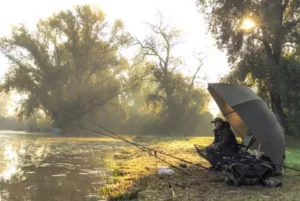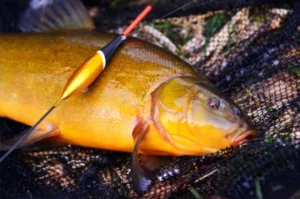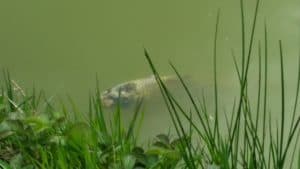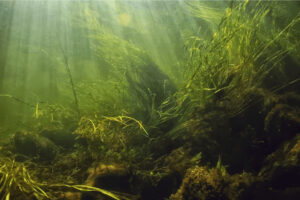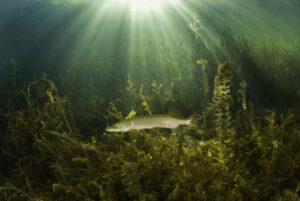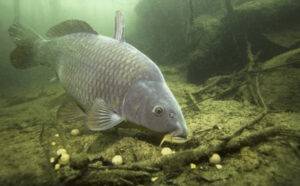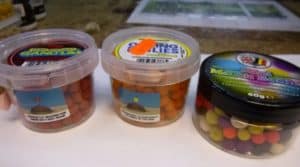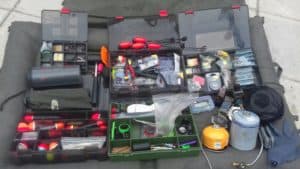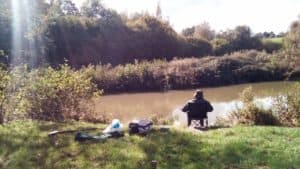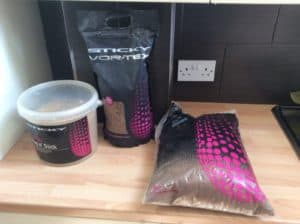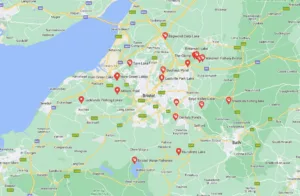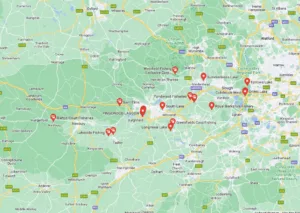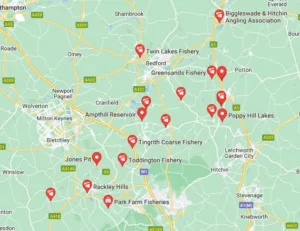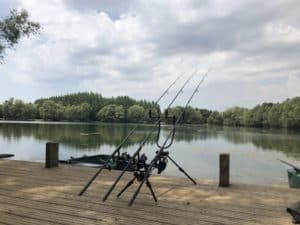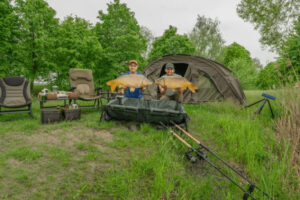Carp care and correct fish handling is the number one thing to learn when starting out carp fishing.
Carp fishing is one of the most popular angling sports in the world, and for good reason.
It’s a challenging but rewarding experience for both novice and veteran anglers alike.
However, it’s important to remember that the fish need to be cared for properly to ensure their well-being.
In this post, we’ll discuss the strategies for minimizing stress on the fish during carp fishing trips. Read on to learn more!
Gear Selection Strategies
When it comes to handling carp, it is important to select the right rod and reel for your type of fishing.
The right rod and reel combination can help you control the fish when you have one on the line.
The last thing you want is to not be able to control the carp and it ends up tied up with your line in snags.
Having a strong reel with a good clutch is important. As is having a strong rod with enough flex to not rip the fish’s mouth to pieces.
Having the right gear will also help you get better performance out of your tackle, helping to ensure that each carp caught is handled properly and with care.
Be sure to do your research when selecting a rod and reel for carp fishing so that you select the one that will meet all of your needs.
Carp Care with Safe Rigs
Having safe rigs is one of the most important aspects of carp fishing. If you are found with unsafe rigs, you risk getting banned from the lake.
Rigs must not be fixed, leads must be able to break away from the rig, and they must be set up in a way in which the carp isn’t trailing around long lengths of line if it snaps.
When you fish at a new lake that you are not familiar with, make sure you read the rules to check what you can and can’t do in terms of rigs.
The Dangers of Lead Core if not Used Properly
What is lead core in fishing?
Lead-core is a type of fishing line that has lead inside the core.
This type of line helps to keep your hook bait at the bottom, but if not used properly it can be dangerous for carp.
The problem with lead core is that when you hook a carp and start to fight it, the line can dig into the carp’s mouth and cause damage.
This can lead to serious issues such as infections, so it is important to be aware of this when using the lead-core line.
I don’t ever use lead-core and have never needed to. I’d suggest you don’t either.
Correct Hooks
When choosing hooks, choose a hook that is the right type for carp fishing, don’t use pike, or sea hooks for example.
Pick a suitable size with the right thickness of the wire. Such as a size 8 to size 6 hook. Also, ensure you check the lake rules to see if you should be using barbed or barbless.
Carp Rig Tubing
Rig tubing is a great product that helps protect fish and is highly encouraged. The tubing can prevent the line lifting scales when fighting a carp.
Unhooking Tools
It’s imperative that you have unhooking tools in your tackle box. For most occasions, you won’t need any and you should be able to take the hook out with your finger. But on the odd occasion, the carp hook will go deeper into the carp’s mouth and you will need a pair of long forceps.
Unhooking Mats and Cradles
All lakes will insist you have an unhooking mat or carp cradle, and I do too. Don’t start fishing until you have your net and cradle ready.
Remember to get a bucket of water ready nearby too, so that you can wet the unhooking mat or cradle before placing the carp on it.
Make sure it is big enough to contain the biggest carp in the lake you are fishing. You never know when the big one is going to come out. And, the last thing you want is an unhooking mat that is too small for the fish.
It’s likely that the most damage is going to be caused by a fish flapping off the unhooking mat.
Cradles are a better option than a cradle if your budget can stretch that far.
How do you keep carp calm?
At some point, you will catch an energetic carp that will flap about on the bank, you will need to know how to stop a carp from flapping.
The best way is to gently lay a wet cloth or towel over its head and eyes.
If it continues to flap, but sure to firmly hold the carp on the mat or cradle, but not too hard.
To minimise the chance of a carp flapping on the bank, it’s best to not net it so quickly and let it do all of the fighting in the water.
Let the carp wear itself out in the water, which is the safest option, and will likely flap less on the bank.
Carp Care Treatment
A propolis carp care kit is also a must-have piece of kit every time you go fishing.
Propolis carp care treatment is a natural product that helps to heal and protect wounds caused by hooks. It’s easy to use, simply apply the propolis directly to the wound and massage it into the area until it is absorbed.
It will help reduce inflammation and can be used on both fresh and old injuries. Make sure to use it every time you remove the hook from a carp to reduce any risk of infection.
It can also help protect against diseases such as fungal infections, so it’s always best to have a propolis carp care kit on hand just in case.
Further reading: https://www.fishingagain.com/carp-care-care-fish-caught/
How long is a carp OK out of water?
Generally, carp should be kept in the water for as long as possible and not taken out for longer than a few minutes.
If you have to take them out of the water, keep it brief and try to wet your hands or any surface they come into contact with. Make sure to return them to the water as soon as possible and handle them with care.
Remember, carp are extremely sensitive so please make sure you use the correct tackle, unhooking tools, and carp care products to ensure their welfare at all times.
How long can you leave a carp in a retainer sling?
45 minutes is the maximum time a carp should be left in a retainer sling, whilst some anglers aim for around 15-30mins.
You can leave it longer but this increases the chances of damaging the fish so please keep an eye on your carp and release it as soon as possible.
Remember to ensure adequate water flow over the gill plate, and always make sure to wet your hands or any surface it comes into contact with.
Finally, never leave a retainer sling on the bank – always return the carp to the water immediately after unhooking them. Doing so will ensure their welfare at all times.
Proper Handling Techniques
When lifting a carp out of the water, it’s important to support the fish’s body weight; this will reduce stress on its internal organs and prevent damage.
Release Methods
When lifting carp back into the water, make sure their fins are tucked into their bodies.
Always lift the fish in a net or weighing sling. Don’t carry the fish in your hands.
Lower the fish into the water and keep it supported until it swims away. Don’t just let go as soon as it is in the water as it will need time to recover after being out of the water.
All in all, it is important to remember the proper techniques for handling carp when fishing.
Releasing the fish back into the water as quickly as possible will help reduce stress on the fish and make the experience better for everyone involved.
Additionally, if carp are not handled with care during the catch and release process there can be a significantly reduced chance of survival.
Being aware of these techniques when carp fishing can help preserve local fisheries for generations to come.
Carp Care Conclusion
To sum it up, it’s important to think about carp care when you go carp fishing.
Using the strategies discussed in this article — such as practicing catch and release, using barbless hooks, preparing for a quick release, and more – you can ensure that the fish are stress-free during and after your fishing trips.
Moreover, these strategies can also make your fishing trips more enjoyable and rewarding.
So be sure to keep these tips in mind the next time you go out to catch some carp.
Related Posts
I have made a lot of mistakes during my fishing sessions and don’t want you to make the same mistakes. I’ve learned the hard way over 20 years of fishing most weekends, testing, tweaking, and testing again and now want to help you excel with your carp fishing.
If you need any help, you can reach me at Fishing Again’s Facebook page
Last Updated on February 11, 2024 by Shane


